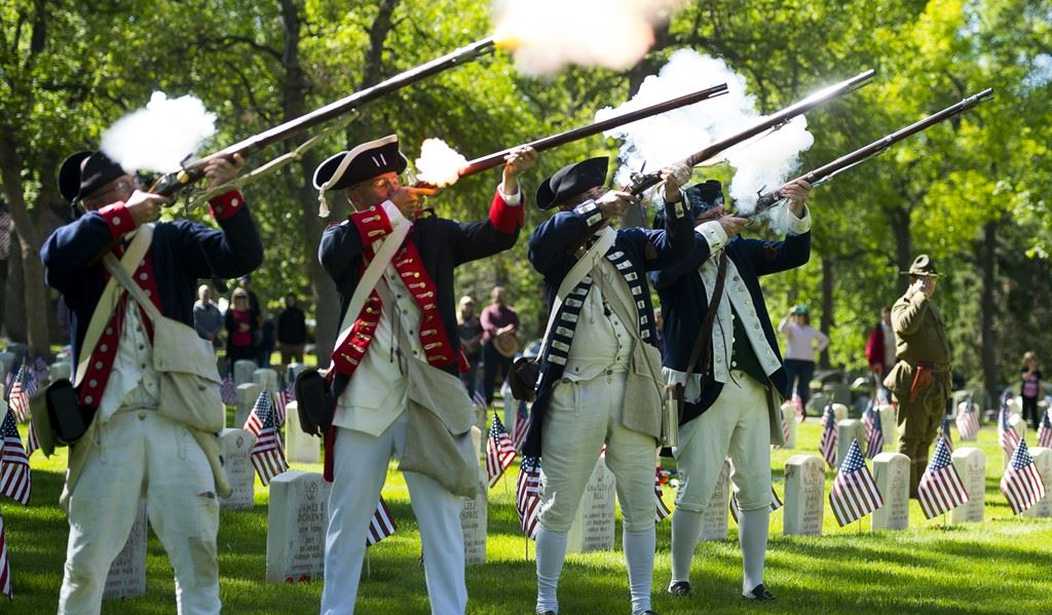Today is Martin Luther King, Jr. Day, which leftists now love to exploit to push critical race theory and pretend they honor the black heroes of American history. But in my research of recent years, I discovered dozens of black American heroes whose courage and sacrifice shaped this country and who are barely known at all. James Armistead Lafayette went from being a slave to being one of the best spies working for the Americans during the American Revolution.
Armistead Lafayette outwitted British commander Gen. Cornwallis and provided George Washington vital information that contributed to the victory at the Battle of Yorktown. The Marquis de Lafayette paid tribute to Armistead Lafayette’s heroism and intelligence, and the former slave’s story would make an epic movie. Without his work, the Revolution might not have reached a successful conclusion at Yorktown, and history might be very different.
The American Army during the Revolution was racially integrated, and there are numerous black American heroes of the Revolution. To name just a few, there were Peter Salem and Salem Poor, the heroes of Bunker Hill; Cato, the slave-turned-spy who became a key part of Washington’s Culper Spy Ring; Phillis Wheatley, whose poetry inspired George Washington and Ben Franklin; and the racially integrated regiments whose daring deeds marked them down in history as Washington’s Indispensables and Immortals. But perhaps the greatest black hero of the American Revolution was a man whose spy work was essential for the Patriot victory at Yorktown, which ended the war and definitively defeated Great Britain.
According to America Battlefield Trust, James Armistead was born into slavery circa 1760, and lived much of his life on a New Kent, Virginia, plantation. Armistead, as was common at the time, took his last name from his master, William Armistead. James was working as a clerk for William Armistead, ATI relates, as William managed Virginia’s military supplies during the Revolution. William, upon request, gave James permission in 1781 to enlist in the French Allied units under the command of the famed Marquis de Lafayette. While serving in the French Allied units, James Armistead was sent by Lafayette to British Gen. Lord Cornwallis’s headquarters as a spy.
James Armistead posed as a runaway slave, according to American Battlefield Trust. Since a number of runaway slaves sought protection from the British during the Revolution, hoping for freedom (the British did promise freedom to many slaves to spite the Americans), and since Armistead was a “native Virginian with extensive knowledge of the terrain, the British received him without suspicion,” as American Battlefield Trust relates. Armistead thus achieved a feat that was rare even among George Washington’s talented spy network; that is, Armistead became a double agent who had direct access to the “center of the British War Department” in America.
“After successfully infiltrating British intelligence, Armistead floated freely between the British and American camps,” American Battlefield Trust writes. “As a double agent, he relayed critical information to Lafayette and misleading intel to the enemy.” Armistead was so convincing that the “oblivious” British assigned Armistead to help American traitor Benedict Arnold. Fortunately, Arnold didn’t realize that Armistead was helping the Patriots, and in “helping Arnold maneuver his troops through Virginia, Armistead gained significant insight into the Redcoats’ movements.”
Genevieve Carlton explained for ATI how the very racism and elitism of the British worked in Armistead’s favor. James was not only clever but educated—he could read and write. That was not something the British knew or cared to find out, and, to their own detriment, they assumed Armistead was illiterate. They also didn’t mind what they said around Armistead, who was quick to catch any bit of valuable intelligence.
”[Cornwallis] appointed Armistead to serve at the British officers’ table, an invaluable place to garner intel for the colonial army. Indeed, Armistead took full advantage of this position and eavesdropped on Cornwallis as he discussed strategy with his officers.
The British also wrongly assumed that Armistead was illiterate and left reports and maps where the spy could easily copy them. In plain sight, Armistead sent written reports daily to Lafayette.”
Carlton notes that Armistead’s detailed intelligence was “critical” in helping Lafayette avoid meeting the British in battle with his much smaller force. “Armistead was also a key link in the colonial spy network,” Carlton writes. “He could transmit Lafayette’s instructions to other spies hidden behind enemy lines.” And he did it so successfully that the British only discovered how thoroughly they had been duped after they surrendered to the American Patriots at Yorktown.
Cornwallis was so convinced of the double agent’s loyalty to the British that he asked Armistead to spy on his secret boss, Lafayette! But, Carlton writes, nothing (and the British were offering freedom to slaves who defected to their ranks) shook Armistead’s dedication to the Patriot cause. In fact, Armistead fed the British general false intelligence. For instance, he once gave Cornwallis a letter that tricked him into not attacking Lafayette’s troops.
American Battlefield Trust says that several of James Armistead’s “finest acts” happened around the 1781 Battle of Yorktown, which was the crucial climax of the American Revolution. Carlton explains that George Washington’s plan to blockade the British at Yorktown and force a surrender could have gone seriously wrong without reliable intel on British movements. Knowing that, Washington applied to Lafayette—who had the perfect source of information.
”On July 31, 1781, James Armistead submitted a detailed report on British locations and Cornwallis’s strategy.
Based on Armistead’s report, Washington and Lafayette implemented the plan. They successfully cut off British reinforcements from Yorktown where the final battle of the war would begin a few weeks later.”
James Armistead had one more surprise in store for Gen. Cornwallis after the surrender at Yorktown, Carlton notes. After indicating his surrender, the defeated British commander entered Lafayette’s tent headquarters—and came face-to-face with James Armistead. I don’t know exactly what Cornwallis’s reaction was, but it was only at that moment he realized this trusted spy was actually a Patriot double agent. The arrogant, titled British lord and general had been thoroughly outwitted by an American slave.
Unfortunately, James Armistead’s unshakeable loyalty to the cause of freedom did not bring that precious blessing to him right away. The Virginia Emancipation Act of 1783 freeing all enslaved Patriot soldiers did not apply to Armistead, sadly, because he had been a spy. Carlton says that William Armistead, James’s master, found himself unable to free James legally without an act of the Virginia General Assembly and petitioned for James’s freedom himself—a request that was not granted.
American Battlefield Trust notes that, after years of unsuccessfully petitioning to get his freedom, Armistead received help from an unexpected quarter. The Marquis de Lafayette discovered that his former trusty spy was still enslaved. Carlton quotes Lafayette’s laudatory 1784 appeal:
”His intelligence from the enemy’s camp were industriously collected and more faithfully delivered. He properly acquitted himself with some important commissions I gave him and appears to me entitled to every reward his situation can admit of.”
Unfortunately, even Lafayette’s appeal did not immediately have the desired effect. William Armistead again submitted his own appeal along with the Marquis’s letter in 1786, and in 1787 James Armistead was finally a free man. In gratitude to the Marquis, James took the Frenchman’s last name as his own, and until his 1832 death he was known as James Armistead Lafayette.
American Battlefield Trust says that James Armistead Lafayette received an annual pension and bought a 40-acre farm in Virginia, where he married, raised a family, and ran his farm as a freeman. But James had one more moment of public glory, though insufficient as a recognition of all he’d done for America. In 1824, as the now-elderly Marquis de Lafayette was making a grand tour of the United States, he happened to see James Armistead Lafayette in the crowd watching him. The Marquis stopped his carriage and warmly embraced James, demonstrating that he, at least, knew just how much James had sacrificed and just how key the former slave was in the American fight for freedom.
James Armistead Lafayette was a brilliant spy, a selfless Patriot, a daring double agent, and a man who fought just as hard for other men’s liberty as he had to fight for his own. It’s time that we resurrect his story and give him the honor and gratitude he so richly deserved.









Join the conversation as a VIP Member